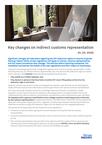
Key changes on indirect customs representation
Last year's tax package significantly changed the regulations on indirect customs representation. Under the new provisions, an indirect customs representative may only exercise VAT deduction rights on behalf of the importer if the importer meets the following additional conditions:
- They qualify as a reliable taxpayer, and
- They declare in advance that they hold a monthly VAT return filing status at the time the deduction right is exercised.
However, one key requirement remains unchanged: the importer must still have an unlimited right to deduct VAT and must provide a declaration confirming this fact to the indirect customs representative.
For many importing companies, however a challenge may arise if they do not qualify as reliable taxpayers. In such cases if they do not qualify as risky taxpayer either, the right to deduct VAT can be transferred to the indirect customs representative, provided that certain conditions are met. Therefore, for taxpayers with ageneral classificationmust undergo a partner screening process conducted by the customs representative to assess potential tax risks before their import VAT can be assigned for deduction. This marks a significant shift in regulation, introducing continuous monitoring of importers, therefore the ability to assign VAT deduction rights will now depend on this ongoing assessment.
The partner screening process will also subject to strict regulations:
- It must be carried out before signing the contract between the importer and the customs representative.
- It must be repeated monthly, by the last day of each month, unless any imports were made during that period.
- The customs representative must provide the tax authority with the results of the screening by the 10th day of the month following the reference month using the KVKPELL form via ONYA interface. Failure to meet this deadline will result in the loss of VAT deduction rights.
To ensure uniform procedures, the tax authority has published detailed guidelines on its website outlining specific aspects of the process. It is emphasized that partner screening is the responsibility of the indirect customs representative. During the procedure, the customs representative assesses risks by analysing data provided by the tax authority and information from their own sources. However, this assessment is based not only on objective but also on subjective information.
The tax authority primarily recommends the use of publicly available data sources such as company registries, mapping services, and the verification of websites and email providers. Additionally, tax authority-managed databases can be checked, and data can also be requested directly from the importer, including documents related to the completion of import transactions, transport certifications, and references.
Additionally, customs representatives may request relevant importer data electronically (e.g., taxpayer classification, filing frequency) from the tax authority, but only with the importer’s written consent. The tax authority must provide this information within eight days.
Overall, partner screening serves as a preliminary assessment of the importer. In general, the tax authority expects all taxpayers to conduct similarly comprehensive partner verifications before establishing any business relationship. Consequently, the tax authority’s published guidelines on business partner verification are also relevant in the context of imports.
The tax authority provides examples of cases where tax risks may arise concerning an importer. Such cases include being listed on a sanctions list, having a revoked tax number, or having failed a recent tax audit. However, the tax authority also highlights that determining tax risk requires evaluating multiple factors together. The fact that an importer is not on sanctions lists and appears to meet partner screening criteria does not automatically mean that no tax risk exists.
The customs representative is always responsible for the outcome of the partner screening. This also means that, during a tax audit, the tax authority may deny the right to deduct VAT if they can prove that the customs representative did not exercise due diligence in verifying the importer.
The outcome of the partner verification does not, in itself, affect the legal status of the customs representative. Even if tax risks are identified, they may still perform their duties related to import transactions; however, they may not deduct the import VAT related to those transactions in their tax return.
The full guidance published by the tax authority is available at the following link: (https://nav.gov.hu/ugyfeliranytu/eljarasi-kerdesek/a-kozvetett-vamjogi-kepviselok-partnerellenorzeseinek-szempontjai).
If the importer holds an import VAT self-assessment permit, consequently neither the declaration nor the partner screening is required for the customs representative to exercise VAT deduction rights. However, in this case, the customs representative must also qualify as a reliable taxpayer.
The customs representative must also include the following import details in their tax return:
- The reference number of the customs notification or decision;
- the importer's tax number; and
- the VAT base and VAT amount.
There is no change to the requirement that the customs representative must be a domestic taxpayer without any limitations for VAT deduction right and must hold the above-mentioned declaration from the importer.
The aim of these new rules is to enhance transparency and legal certainty in customs representation, placing additional obligations on customs representatives. While most importing companies will be able to meet these conditions without difficulty, it is crucial for all affected businesses to prepare in advance. If a company files VAT returns quarterly but now needs to switch to monthly filings to comply with the new rules, it is recommended to notify the tax authority as soon as possible to ensure a smooth transition.


